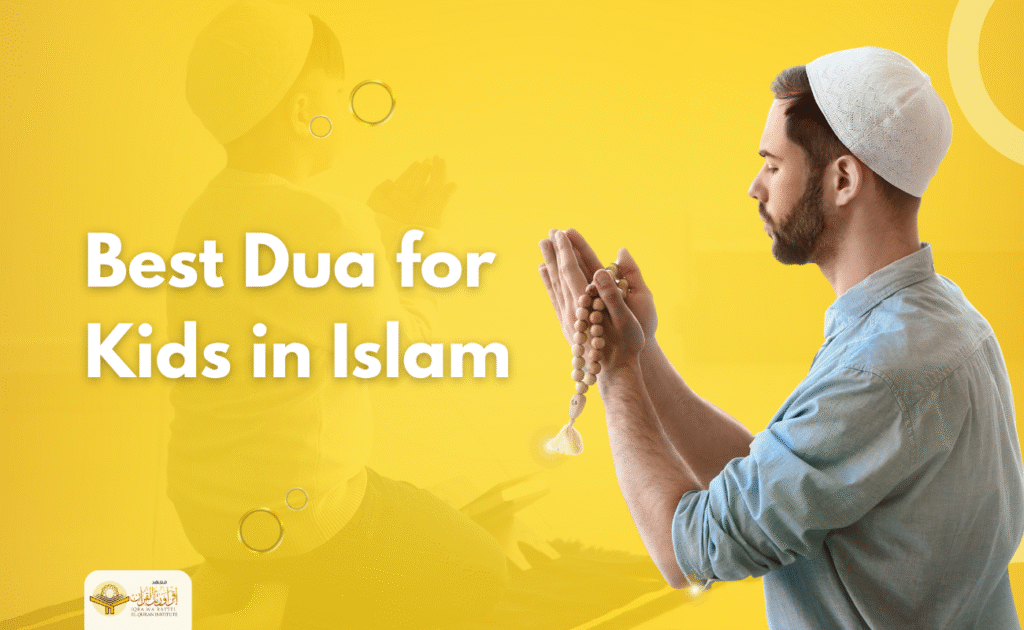In the beautiful journey of Islamic parenting, few practices are as fundamental and transformative as teaching children the art of dua (supplication). Dua represents more than just reciting memorized prayers—it is the spiritual lifeline that connects our children directly to their Creator, fostering a relationship built on trust, gratitude, and unwavering faith. As parents and guardians, equipping our children with the power of dua is one of the greatest gifts we can bestow upon them, creating a foundation that will support them through every challenge and triumph in their lives.
What is Dua for Kids in Islam?
A dua for kids is a supplication or prayer made by parents, guardians, or the children themselves, seeking Allah’s protection, guidance, blessings, and success. The Prophet Muhammad ﷺ emphasized the profound importance of dua when he said:
“The supplication is the essence of worship.” — Jami’ at-Tirmidhi 3371
Dua is not merely a ritual; it is a conversation with Allah, an acknowledgment of our complete dependence on Him, and a manifestation of our humility before His greatness. For children, learning to make dua teaches them that Allah is always near, always listening, and always ready to respond to their needs.
Allah Himself promises in the Quran:
“When My servants ask you, O Prophet about Me: I am truly near. I respond to one’s prayer when they call upon Me. So let them respond with obedience to Me and believe in Me, perhaps they will be guided to the Right Way.” — Quran 2:186
Why Teaching Dua to Children is Essential
1. Establishing a Direct Connection with Allah
Dua is the most powerful instrument for developing a personal relationship with Allah. Unlike formal prayers (Salah) that follow specific structures, dua can be made anywhere, at any time, in any language, about anything. This accessibility makes it perfect for children to begin their spiritual journey.
2. Building Character and Values
Regular practice of dua instills essential Islamic values in children:
- Humility: Recognizing that all power belongs to Allah alone
- Gratitude: Thanking Allah for blessings big and small
- Patience: Understanding that Allah’s timing is perfect
- Trust (Tawakkul): Relying on Allah in all circumstances
- Hope: Maintaining optimism through faith
3. Emotional and Psychological Benefits
Teaching children to make dua provides:
- Emotional stability during times of fear or distress
- Mental well-being through a sense of divine protection
- Stress relief by transferring worries to Allah
- Confidence knowing they have a constant source of support
- Resilience to face life’s challenges
4. Protection from Harm
Islamic tradition teaches that dua creates a spiritual shield around believers, protecting them from:
- Physical harm and accidents
- Evil influences and negative energies
- The evil eye (Nazar)
- Harmful whispers of Shaytan
- Spiritual vulnerabilities
Powerful Duas Parents Should Make for Their Children
1. Dua for Righteous and Comforting Offspring
One of the most comprehensive duas found in the Quran:
Arabic: رَبَّنَا هَبْ لَنَا مِنْ أَزْوَٰجِنَا وَذُرِّيَّـٰتِنَا قُرَّةَ أَعْيُنٍۢ وَٱجْعَلْنَا لِلْمُتَّقِينَ إِمَامًا
Transliteration: Rabbana hab lana min azwajina wa dhurriyatina qurrata a’yunin wa-j’alna lil-muttaqina imama
Translation: “Our Lord, grant us from among our wives and offspring comfort to our eyes and make us an example for the righteous.” — Quran 25:74
This powerful dua asks Allah to make our children the coolness of our eyes (qurrata a’yun)—a source of joy, peace, and contentment who bring us happiness through their righteousness.
2. Dua for Good and Righteous Children
Arabic: رَبِّ هَبْ لِي مِنَ الصَّالِحِينَ
Transliteration: Rabbi hab li min as-saaliheen
Translation: “My Lord, grant me [a child] from among the righteous.”
This was the dua of Prophet Ibrahim (Abraham) ﷺ, and Allah answered it by blessing him with prophets from his lineage, including our beloved Prophet Muhammad ﷺ.
3. Dua for Children Who Establish Prayer
Arabic: رَبَّنَا وَاجْعَلْنَا مُسْلِمَيْنِ لَكَ وَمِنْ ذُرِّيَّتِنَا أُمَّةً مُسْلِمَةً لَكَ
Transliteration: Rabbanaa wa-aj’alnaa muslimayn laka wa-min dhurriyyatinaa ummatan muslimatan laka wa-arinaa manaasikanaa wa-tub ‘alaynaa innaka anta at-tawwaab ar-raheem
Translation: “Our Lord! Make us both [fully] submit to You and from our descendants a nation that will submit to you. Show us our rituals, and accept our repentance. You are truly the Acceptor of Repentance, Most Merciful.” — Quran 2:128
4. Dua for Children’s Health and Well-being
Arabic: اللَّهُمَّ عَافِنِي فِي بَدَنِي، اللَّهُمَّ عَافِنِي فِي سَمْعِي، اللَّهُمَّ عَافِنِي فِي بَصَرِي، لاَ إِلَهَ إِلاَّ أَنْتَ
Transliteration: Allaahumma ‘aafinee fee badanee, Allaahumma ‘aafinee fee sam’ee, Allaahumma ‘aafinee fee basaree, laa ilaaha illaa anta
Translation: “O Allah, make me healthy in my body. O Allah, make me healthy in my hearing. O Allah, make me healthy in my sight. There is no god but You.” — Sunan Abi Dawud 5090
Essential Daily Duas Children Should Learn
1. Dua Before Eating
Arabic: بِسْمِ اللهِ
Transliteration: Bismillah
Translation: “In the name of Allah”
Extended version: بِسْمِ اللهِ وَبَرَكَةِ اللهِ
Bismillah wa barakatillah — “In the name of Allah and with the blessings of Allah”
2. Dua After Eating
Arabic: الْحَمْدُ لِلَّهِ
Transliteration: Alhamdulillah
Translation: “All praise is for Allah”
Extended version: الْحَمْدُ لِلَّهِ الَّذِي أَطْعَمَنَا وَسَقَانَا وَجَعَلَنَا مُسْلِمِينَ
Alhamdulillahil-lathee at’amana wa saqana wa ja’alana Muslimeen “Praise be to Allah who has fed us and given us drink and made us Muslims.”
3. Dua Before Sleeping
Arabic: بِاسْمِكَ رَبِّي وَضَعْتُ جَنْبِي وَبِكَ أَرْفَعُهُ
Transliteration: Bismika Rabbi wada’tu janbi wa bika arfa’uhu
Translation: “In Your name, my Lord, I lie down and in Your name I rise.”
Alternative: اللَّهُمَّ بِاسْمِكَ أَمُوتُ وَأَحْيَا
Allahumma bismika amutu wa ahya “O Allah, in Your name I die and I live.”
4. Dua Upon Waking Up
Arabic: الْحَمْدُ لِلَّهِ الَّذِي أَحْيَانَا بَعْدَ مَا أَمَاتَنَا وَإِلَيْهِ النُّشُورُ
Transliteration: Alhamdulillahil-lazi ahyana ba’da ma amatana wa ilaihin-nushoor
Translation: “All praise is for Allah, who gave us life after having taken it from us, and unto Him is the resurrection.”
5. Dua for Entering the Home
Arabic: بِسْمِ اللهِ وَلَجْنَا، وَبِسْمِ اللهِ خَرَجْنَا، وَعَلَى رَبِّنَا تَوَكَّلْنَا
Transliteration: Bismillahi walajna, wa bismillahi kharajna, wa ‘ala Rabbina tawakkalna
Translation: “In the name of Allah we enter and in the name of Allah we leave, and upon our Lord we place our trust.”
6. Dua for Leaving the Home
Arabic: بِسْمِ اللهِ، تَوَكَّلْتُ عَلَى اللهِ، وَلاَ حَوْلَ وَلاَ قُوَّةَ إِلاَّ بِاللهِ
Transliteration: Bismillahi, tawakkaltu ‘alallahi, wa laa hawla wa laa quwwata illaa billaah
Translation: “In the name of Allah, I place my trust in Allah, and there is no might nor power except with Allah.”
7. Dua for Entering the Mosque
Arabic: اللَّهُمَّ افْتَحْ لِي أَبْوَابَ رَحْمَتِكَ
Transliteration: Allahumma-aftah lee abwaba rahmatik
Translation: “O Allah, open the gates of Your mercy for me.”
8. Dua for Leaving the Mosque
Arabic: اللَّهُمَّ إِنِّي أَسْأَلُكَ مِنْ فَضْلِكَ
Transliteration: Allahumma inni as’aluka min fadlik
Translation: “O Allah, indeed I ask of You for Your virtue (bounty) and Your mercy.”
9. Dua for Studying and Increasing Knowledge
Arabic: رَّبِّ زِدْنِى عِلْمًۭا
Transliteration: Rabbi zidnee ‘ilmaa
Translation: “My Lord! Increase me in knowledge.” — Quran 20:114
This is the dua Allah taught Prophet Muhammad ﷺ himself. Children should recite this before studying or taking exams.
10. Dua to Make Things Easy
Arabic: رَبِّ اشْرَحْ لِي صَدْرِي وَيَسِّرْ لِي أَمْرِي
Transliteration: Rabbi shrah li sadri wa yassir li amri
Translation: “My Lord, expand for me my breast [with assurance] and ease for me my task.” — Quran 20:25-26
This was the dua of Prophet Musa (Moses) ﷺ before his monumental task.
Protective Duas for Children’s Safety
1. The Three Quls (Protective Surahs)
The Prophet ﷺ said:
“Reciting Surah al-Ikhlas and the Mu’awwidhatayn (Surah al-Falaq and Surah al-Naas) three times in the morning and three times in the evening will suffice you in all respects.” — Sunan al-Tirmidhi #3575
Surah Al-Ikhlas (Chapter 112) – Reaffirms the oneness of Allah Surah Al-Falaq (Chapter 113) – Protection from external evils Surah Al-Naas (Chapter 114) – Protection from internal threats and whispers of Shaytan
2. Ayatul Kursi (The Throne Verse)
Reciting Ayatul Kursi (Quran 2:255) provides divine protection. The Prophet ﷺ said that whoever recites it after every obligatory prayer, nothing prevents them from entering Paradise except death.
3. Last Two Verses of Surah Al-Baqarah
The Prophet ﷺ emphasized:
“Whoever recites the last two verses of Surah al-Baqarah in the night, it is enough for him.” — Sahih al-Bukhari #5051
These verses (2:285-286) provide comprehensive protection throughout the night.
4. Dua for Protection from the Evil Eye
Arabic: أَعُوذُ بِكَلِمَاتِ اللهِ التَّامَّاتِ مِنْ كُلِّ شَيْطَانٍ وَهَامَّةٍ وَمِنْ كُلِّ عَيْنٍ لَامَّةٍ
Transliteration: A’udhu bi kalimatillahi at-tammati min kulli shaytanin wa hammatin wa min kulli ‘aynin lammah
Translation: “I seek refuge in the perfect words of Allah from every devil and poisonous reptile, and every envious eye.”
5. Morning and Evening Protection Dua
Arabic: بِسْمِ اللهِ الَّذِي لاَ يَضُرُّ مَعَ اسْمِهِ شَيْءٌ فِي الْأَرْضِ وَلاَ فِي السَّمَاءِ وَهُوَ السَّمِيعُ الْعَلِيمُ
Transliteration: Bismillahil-lazi la yadurru ma’asmihi shay’un fil-ardhi walafis-sama’i wahuwas-samiul-‘alim
Translation: “In the name of Allah with Whose Name nothing on earth or in heaven can cause harm. And He is All-Hearing, All-Knowing.”
Recite this three times in the morning and evening.
Practical Strategies to Teach Children Dua
1. Start Early and Keep it Simple
Begin teaching duas when children are very young, even as toddlers. Start with the simplest ones:
- Bismillah (before eating)
- Alhamdulillah (after eating)
- Subhanallah (to praise Allah)
These short, easy-to-pronounce phrases build a foundation for more complex duas later.
2. Make Dua a Family Activity
Research shows that group learning produces better results and creates stronger inclinations toward the activity. Make dua time a cherished family ritual:
- Dinner table duas: Gather before meals to recite Bismillah together
- Bedtime routine: Recite sleeping duas as a family
- Travel duas: Say them together before car journeys
- Morning gatherings: Start the day with morning adhkar as a family
3. Lead by Example
Children are natural imitators. They observe and replicate their parents’ behavior. If you want your children to love dua:
- Make dua regularly in front of them
- Show emotion and sincerity when making dua
- Let them see you turn to Allah in both joy and difficulty
- Share with them when your duas are answered
- Maintain consistency in your own dua practice
4. Use Visual Aids and Technology
Modern tools can make learning engaging:
- Colorful dua posters in their room
- Dua cards with illustrations
- Islamic apps with audio recordings
- Animated videos teaching duas
- Dua books designed for children
5. Connect Duas to Daily Activities
Help children associate specific duas with routine activities:
- Bathroom visits
- Getting dressed
- Looking in the mirror
- Entering/leaving home
- Going to school
- Playing outside
- Seeing rain or lightning
This creates natural reminders and builds habits organically.
6. Explain the Meanings
Don’t just teach memorization—explain what each dua means. Children are more likely to internalize and value what they understand. Break down complex concepts into age-appropriate explanations.
7. Celebrate Milestones
Acknowledge and celebrate when children:
- Memorize a new dua
- Make dua independently
- Remember to make dua without prompting
- Teach duas to younger siblings
Positive reinforcement encourages continued learning.
8. Create Dua Journals
For older children, encourage keeping a “dua diary” where they:
- Write down their personal duas
- Record answered prayers
- Express gratitude
- Reflect on their relationship with Allah
Benefits of Teaching Dua to Children
Spiritual Benefits
- Strengthens faith (Iman) through direct connection with Allah
- Increases God-consciousness (Taqwa)
- Develops sincerity (Ikhlas) in worship
- Builds trust in divine wisdom (Tawakkul)
Emotional Benefits
- Provides comfort during difficult times
- Reduces anxiety by transferring worries to Allah
- Builds emotional resilience and coping mechanisms
- Fosters inner peace and contentment
Social Benefits
- Cultivates empathy when praying for others
- Develops compassion and caring nature
- Strengthens family bonds through collective worship
- Creates gratitude for blessings received
Practical Benefits
- Protection from harm through divine intervention
- Guidance in decision-making
- Success in endeavors blessed by Allah
- Increased barakah (blessings) in life
When Duas Are Most Likely to Be Accepted
Teach children that while Allah always hears our duas, there are special times when acceptance is more likely:
Special Times:
- Last third of the night (Tahajjud time)
- Between Adhan and Iqamah
- During prostration (Sujood) in prayer
- On Fridays (especially the last hour before Maghrib)
- During Ramadan (especially Laylatul Qadr)
- While fasting (especially at the time of breaking fast)
- When rain is falling
- While traveling
- When sick or in difficulty
Special Actions That Increase Acceptance:
- Sending blessings upon Prophet Muhammad ﷺ (Salawat)
- Being in a state of wudu (ablution)
- Facing the Qiblah
- Raising hands in supplication
- Making dua for others before oneself
- Giving charity before dua
- Seeking forgiveness (Istighfar) before dua
- Using Allah’s beautiful names (Asma ul-Husna)
Teaching Children About Dua Acceptance
This is a delicate topic that requires wisdom. Children need to understand:
1. Allah Always Hears
Every single dua is heard by Allah. He never ignores us. This is guaranteed in the Quran (2:186).
2. Allah Answers in Three Ways:
- Immediate acceptance: The exact thing we asked for
- Delayed acceptance: Something better is planned for later
- Protection from harm: Allah prevents something bad instead
- Reward in Akhirah: The dua becomes a treasure in the Hereafter
3. Trust Allah’s Wisdom
Sometimes what we want isn’t what’s best for us. Allah knows what we don’t know. Teach children this through age-appropriate examples.
4. Persistence is Key
The Prophet ﷺ taught us never to give up making dua. Consistent supplication itself is a form of worship that brings reward.
Protecting Your Home Through Dua and Quran
The Prophet ﷺ said:
“Do not turn your houses into graveyards. Verily, Satan flees from the house in which Surah al-Baqarah is recited.” — Sahih Muslim #780
Create a spiritually protected home environment by:
- Regular Quran recitation by family members
- Keeping Qurans in visible, respected places
- Playing Quran audio regularly
- Family Quran study circles
- Teaching children to recite protective verses
A home filled with Quran becomes a sanctuary visited by angels, creating an atmosphere where faith flourishes naturally.
Duas for Specific Situations Children Face
For Good Behavior:
“O Allah, help me to be polite and respectful to others.”
For Success in Exams:
“O Allah, grant me success in my studies and bless me with knowledge.”
When Sick:
Arabic: أَسْأَلُ اللهَ الْعَظِيمَ رَبَّ الْعَرْشِ الْعَظِيمِ أَنْ يَشْفِيَكَ
As’alu Allah al-‘Azim Rabbal ‘Arshil ‘Azim an yashfiyak “I ask Allah the Mighty, Lord of the Mighty Throne, to cure you.”
When Feeling Pain:
“I seek refuge in the Honor of Allah and His Might from what I feel and what I apprehend.”
For Forgiveness:
“O Allah, forgive me for my mistakes and help me become a better person.”
For Parents’ Guidance:
“O Allah, bless my parents with wisdom and guidance so they can raise me righteously.”
The Role of Parents’ Dua for Children
Never underestimate the power of a parent’s dua for their child. The Prophet ﷺ mentioned that parents’ supplications for their children are among those duas that are readily accepted by Allah.
Make it a habit to:
- Make dua during Tahajjud for your children
- Include them in every obligatory prayer
- Make specific duas for their unique challenges
- Pray for their Deen (faith) before their Dunya (worldly matters)
- Ask Allah to guide them to righteousness
- Seek protection from harmful influences
A beautiful habit is to place your hand on your child’s head and make dua for them before they sleep—creating a blessed end to their day.
Conclusion: The Greatest Gift
Teaching our children dua is perhaps the most valuable inheritance we can leave them. It is a gift that:
- Never depletes
- Works in every situation
- Travels with them wherever they go
- Protects them when we cannot
- Connects them to Allah throughout their lives
In a world filled with distractions, anxieties, and challenges, dua equips our children with an unshakeable foundation. It teaches them that they are never alone, never powerless, and never without hope—because they have a direct line to the Most Powerful, the Most Merciful, the All-Hearing.
As we nurture this beautiful practice in our children, we are not just teaching them words to recite; we are cultivating a lifelong relationship with their Creator, one that will guide them through childhood, adolescence, adulthood, and ultimately to success in the Hereafter.
May Allah accept our duas for our children, make them the coolness of our eyes, and make them among the righteous who lead others to goodness. May He protect them from all harm and grant them success in this world and the next. Ameen.



